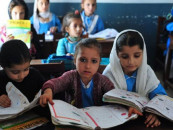Family planning: Women are using the wrong drugs for abortions as quick contraception
Experts warn against certain over-the-counter drugs and a lack of physician consultations.

Family planning: Women are using the wrong drugs for abortions as quick contraception
In fact, a study puts one in six pregnancies ending in abortion. Renowned gynaecologist Dr Shershah Syed estimates that more than 70% of abortions performed in backstreet clinics in unsafe conditions and by unskilled people result in complications or serious infections. More than 80% of abortion-related deaths are caused by infections.
Taking into account the need for an education, understanding and skill development for abortions and other maternal and neonatal challenges, a three-day training workshop was organised at the Najmuddin Auditorium at Jinnah hospital from Friday to Sunday. An intensive course in emergency obstetrics and neonatal care was organised in partnership with the National Committee for Maternal and Neonatal Health (NCMH) with the Association for Mothers and Newborns (AMAN).
“There are many other [safe] methods of family planning and birth spacing women can use yet many [uneducated and rural] women continue to rely on abortions,” said obstetrician and gynaecologist Dr Azra Ahsan, who is also presently the secretary-general for AMAN. Instead, Ahsan says, these women seem to prefer abortions as it is a one-time fix for them as opposed to the daily routine of taking the pill etc.
However, besides the more common prophylactic methods and instruments such as condoms and contraceptive pills, there are other options such as the ‘coil’ or intrauterine contraceptive device or injections, which can protect against unwanted pregnancies for an extended period of time.
But Ahsan highlights another risky trend surrounding women seeking abortions. They visit the pharmacist before consulting the doctor. “Pharmacists prescribe a medication, Gynaecosid, which they believe induces an abortion but in reality it doesn’t,” Ahsan says. What actually happens is if a woman misses her menstrual cycle for any other hormone-related reasons other than pregnancy Gynaecosid stimulates menstruation. “Once women start bleeding they feel as if they have aborted when in reality they were never pregnant to begin with.”
Misoprostol is considered a safer option but it is not advisable to take it without consulting a doctor. “Misoprostol was originally used to treat gastric ulcers and later it was discovered that abortion was a side effect of the medicine,” Ahsan said. As a golden rule, however, doctors advise that pregnant women should not take medication of any kind, especially during the first trimester.
Speaking separately on the topic, Dr Sherhah Syed says women who may have aborted a pregnancy need to keep extra care not just of their personal hygiene and sanitation but also of the cleanliness of their environment. “Women must be vigilant about infection-control even if the abortion was in a hospital which maintains good standards of quality.” However, he says, women can go back to normal work and personal activities after 48 hours of rest post abortion.
Published in The Express Tribune, January 30th, 2012.



















COMMENTS
Comments are moderated and generally will be posted if they are on-topic and not abusive.
For more information, please see our Comments FAQ